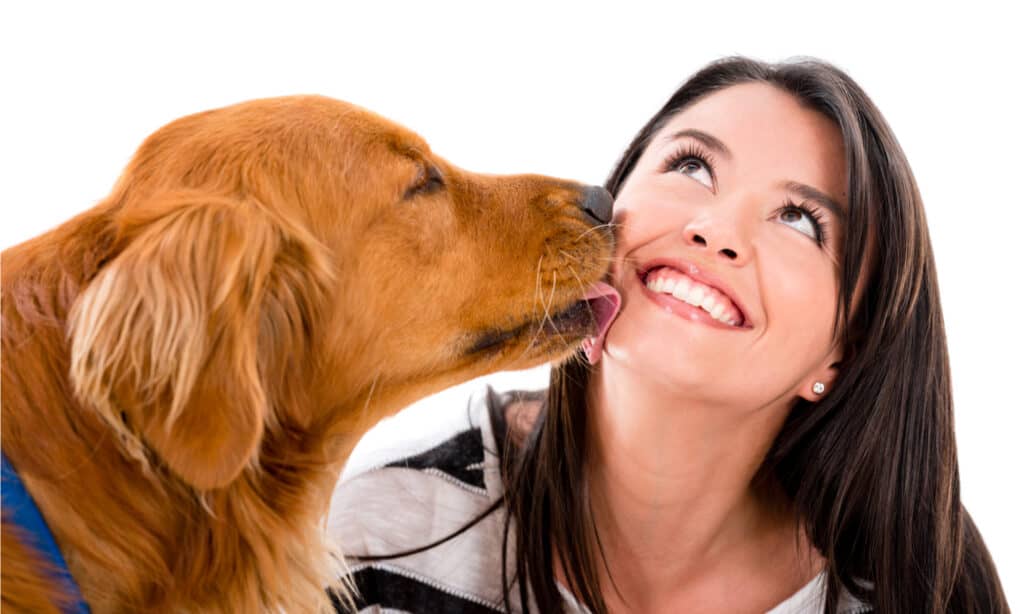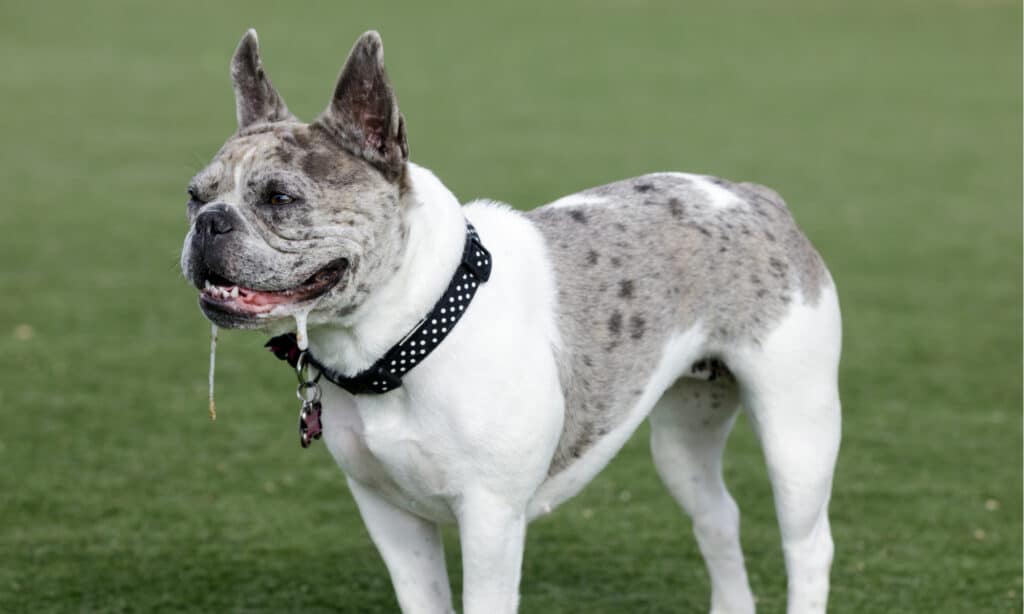One of the biggest complaints people can have about dogs is their drooling. But sometimes they can’t help it, it’s completely normal and natural. Dogs of all breeds drool, some breeds more than others. But is this a problem? No – unless you are wearing a new sweatshirt! The only time you should be concerned is when the drooling becomes excessive and uncontrollable. It can be difficult to distinguish when this drooling is an issue, so it is important to know your dog and its breed.
Breeds such as the Basset Hound, Bloodhound, Boxer, Bulldog, Great Dane, Mastiff, and many more are notorious dribblers! Usually, breeds who have extra skin around their mouths drool more as the saliva can gather here. And in contrast, Corgis, Papillons, Chihuahuas, King Charles, etc. keep their slobber to a minimum. As a dog owner, you need to know which category your dog falls into so that when there is a problem, you will know.
What Is A Dog’s Drool?
The medical term for drool is sialorrhea or ptyalism, and this is essentially the falling of saliva from an animal’s mouth. There are four salivary glands in a dog’s mouth that secrete a thick liquid composed of 98% water and the remaining 2% contains enzymes, electrolytes, and antibacterial compounds. Dogs’ saliva is completely harmless to humans as their mouth bacteria is different from ours, in fact, sharing saliva with another human is technically more dangerous and they share our bacteria and can pass on diseases or illnesses! So when your dog shows you some love with a slobbery kiss, show him some love back!

Some dogs love to kiss, but luckily it is not harmful to humans!
©ESB Professional/Shutterstock.com
Why Does Your Dog Drool?
Dogs drool for a number of reasons, the main being to aid digestion and break down food. You will notice when your dog is enjoying their breakfast, there is always more than usual slobber falling to the floor. Dogs drool in an involuntary action in response to the sight and smell of food. This saliva provides lubrication to the esophagus as they eat as well as moisture and enzymes to break down the larger pieces of food, which is important for those dogs who inhale their meals in one bite!
Dogs’ saliva also acts as an antiseptic which is useful if they ever injure or cut themselves. You will notice your dog licking their wounds and this is to help ease the pain and reduce discomfort. However, excessive licking of wounds isn’t always favorable as this can lead to irritation and redness of the skin, so keep an eye out for this!
Dogs also drool when excited. This is a physiological response to a stimulus, such as greeting their owner at the door or playing with their favorite toy. Dogs will also drool when nervous, so pay attention to your dog’s body language as this can be very telling.
When Should You Be Concerned About Your Dog Drooling?
Sometimes excessive drooling can indicate problems, such as heat stroke, tooth decay, or digestive issues. It is important to be able to notice when there may be a problem, so you can do what you can to help your best friend. Let’s look at a few common reasons for excess drooling that should concern you.
Dental problems
The main cause of too much drooling is dental problems. Wearing a glove, carefully lift your dog’s upper lip and examine his/her teeth and gums. If their teeth show yellow or brown deposits, this can be plaque or tartar building up. Their gums may also be red and swollen, and this can be a sign of mouth ulcers, tooth decay (bad breath will coincide with tooth decay), or in rare cases, a tumor. Usually, if a dog is having an oral issue, this will not affect their eating, unless the condition has gotten very bad. To prevent this, bring your dog to your veterinary clinic for a yearly checkup and teeth cleaning. In between these visits, try and brush your dog’s teeth daily with dog-specific toothpaste.
Heatstroke
Heatstroke is another common and very serious reason your dog is salivating more than usual. Vomiting, diarrhea, heavy panting, and restlessness are also indications of heatstroke. If you notice these symptoms, you will need to act fast as heatstroke can cause your dog to collapse, gain brain damage, or even die. It can take anywhere between a couple of days to a couple of weeks for your dog to fully recover from heatstroke, but when it is so easy to prevent, why allow it to occur in the first place? Some preventative measures include always providing your dog with easy access to water and shade, limiting exercise, and never locking your dog inside your car without ventilation. If your dog enjoys sunbathing too much, you will need to either force him into the shade or pour water on him occasionally to lower his body temperature.

©yhelfman/Shutterstock.com
Stomach issues
Another cause of excessive dribble is stomach issues. Your dog may experience some motion sickness while traveling in a car. This isn’t a serious problem as it should cease once the car stops, but if you find it bothersome, you can consult your veterinarian for some motion sickness medication. However, in more serious situations, sickness may be caused by ingesting something poisonous such as a plant or chemical, or swallowing a sock or toy. Poisonous plants include tulips, chrysanthemums, and azaleas, so I recommend against having these in your garden. Certain species of frogs, spiders, and scorpions are also poisonous to dogs, so if these are common where you live, beware. In this scenario, you will need to immediately get your pet medical attention as this can be fatal. Other symptoms to look out for are shaking and vomiting.
Gastric dilatation and volvulus (GDV), more commonly known as bloat, is another stomach issue that may cause excessive drooling. This is when your dog’s stomach fills up with gas and may twist. This condition can be life-threatening so it is important to know the signs which include restlessness, a swollen abdomen, discomfort, retching, and rapid breathing. Bloat kills about 30% of dogs it affects, so be sure to know the signs to prevent your dog from adding to this statistic!
Kidney Disease
The final condition I am going to discuss is kidney disease. Kidney disease may cause extra saliva to be produced, as well as weight loss, excess urination, vomiting, pale gums, loss of appetite, and imbalance. A healthy and balanced diet is the key to preventing kidney failure, as it is with most organ diseases in dogs. High-quality protein with low sodium and phosphorus and omega 3 fatty acids are excellent additions to your dog’s diet. My general rule of thumb is the lesser amount of ingredients, the more beneficial it is.
Throat issue
If your dog is suffering from an issue with their throat or esophagus, this is also an explanation of why they are drooling more than usual. Something as small as one fragment lodged in your pet’s throat can cause problems, and can also damage nerves and tissues in the digestive tract. To prevent this avoid feeding your dog small bones, especially turkey and chicken bones. Issues with the respiratory tract, such as pharyngitis, can cause problems too. This is when the walls of your dog’s pharynx swell up and can cause breathing difficulties. It is also caused by damage from foreign objects. Always bring your dog to the vet if you are unsure about their behavior.
We all love our best friends and want them to live as long as possible. Some dogs drool quite a bit and some very little. Nobody knows your pet better than you do so keep an eye on your pet when you notice a little more drool than normal. More than often, your dog’s drooling is not something to be concerned about, but knowing when it is a problem may save your pet’s life.
The photo featured at the top of this post is © GoDog Photo/Shutterstock.com
Ready to discover the top 10 cutest dog breeds in the entire world?
How about the fastest dogs, the largest dogs and those that are -- quite frankly -- just the kindest dogs on the planet? Each day, AZ Animals sends out lists just like this to our thousands of email subscribers. And the best part? It's FREE. Join today by entering your email below.
Thank you for reading! Have some feedback for us? Contact the AZ Animals editorial team.






